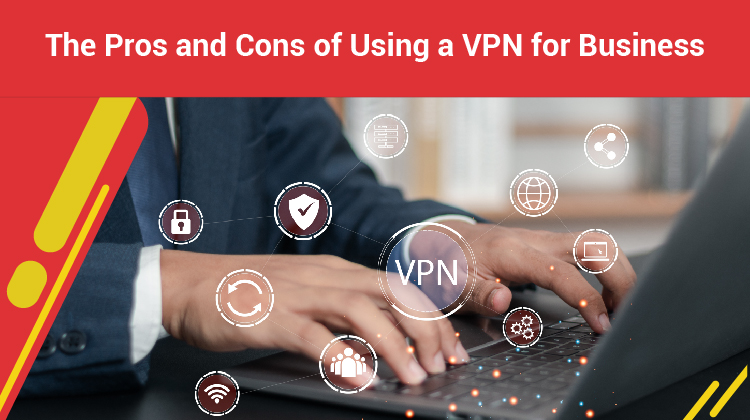VPN Benefits: Pros and Cons for Business
-
64
-
26 Sep 2024
-
4 minutes

Introduction
In today's digital age, cybersecurity is a top priority for businesses of all sizes. One of the tools that has gained popularity in recent years is the Virtual Private Network (VPN). A VPN allows businesses to create a secure connection to another network over the Internet, providing an added layer of protection for sensitive data and communications. But like any technology, there are both pros and cons to using a VPN for business purposes, and understanding these are the first step to choosing the best VPN solutions for business.
Pros of Using a VPN for Business
- Enhanced Security: One of the primary benefits of using a VPN for business is the enhanced security it provides. With a VPN, all data transmitted between your business network and remote users is encrypted, making it much harder for hackers to intercept and access sensitive information.
- Remote Access: VPNs allow employees to securely access the company network from anywhere in the world. This is especially beneficial for businesses with remote workers or employees who travel frequently.
- Bypassing Geo-Restrictions: With a VPN, businesses can bypass geo-restrictions on websites and services. This can be particularly useful for companies that operate in multiple countries and need to access region-specific content.
- Cost-Effective: Using a VPN can be a cost-effective way to increase security for your business. While there may be initial setup costs, the long-term benefits of using a VPN often outweigh the investment.
Cons of Using a VPN for Business
- Slower Connection Speeds: One of the downsides of using a VPN is that it can sometimes slow down your connection speeds. This is because all data is encrypted and routed through the VPN server, which can lead to a decrease in performance, especially for bandwidth-intensive tasks.
- Complexity: Setting up and maintaining a VPN can be complex, especially for businesses with limited IT resources. It requires regular monitoring and updates to ensure that the network remains secure and functional.
- Data Privacy Concerns: While VPNs are designed to protect data, there have been instances where VPN providers have been accused of logging user activity or selling data to third parties. Businesses must carefully vet VPN providers to ensure they are trustworthy and privacy compliant.
Factors to Consider When Selecting a VPN for Business
- Security Protocols: When choosing a VPN for business use, it's important to consider the security protocols offered by the provider. Look for VPNs that use strong encryption standards, such as AES-256, and offer features like kill switches and DNS leak protection.
- Logging Policies: Ensure that the VPN provider has a strict no-logs policy to protect the privacy of your business data. Avoid providers that collect and store user activity logs, as this can pose a risk to your company's sensitive information.
- Scalability: Consider the scalability of the VPN solution, especially if your business is expected to grow in the future. Choose a VPN provider that can accommodate an increasing number of users and devices without compromising performance.
Choosing Business WiFi Providers: ACT Fibernet
When setting up a VPN for your small business, it is essential to ensure that you have a reliable internet connection that can help you choose the best VPN solutions for business. ACT Fibernet is one of the leading business WiFi providers that offers high-speed, secure internet connectivity tailored to the needs of enterprises. With ACT Fibernet, you can enjoy fast and reliable internet access, making it an ideal choice for businesses looking to set up a VPN.
Setting Up a VPN for a Small Business
- Choose a VPN Service: There are numerous business VPN providers available in the market, so it's essential to research and select a reputable provider that offers robust encryption protocols and reliable service.
- Install the VPN Software: Once you have chosen a VPN service, download and install the VPN software on your devices. Most VPN providers offer user-friendly apps that make it easy to connect to the VPN server with just a few clicks.
- Configure VPN Settings: After installing the VPN software, configure the settings according to your business requirements. You can choose the server location, protocol, and encryption level to optimize security and performance.
- Connect to the VPN: Once everything is set up, connect to the VPN server by logging in with your credentials. Your internet connection is now encrypted, ensuring secure communication between your devices and the internet.
Conclusion
In conclusion, while using a secure VPN for business can provide enhanced security and flexibility, it's important to weigh the pros and cons before implementing a VPN solution. By carefully considering factors such as security protocols, logging policies, and scalability, businesses can make an informed decision that meets their specific needs and requirements.






